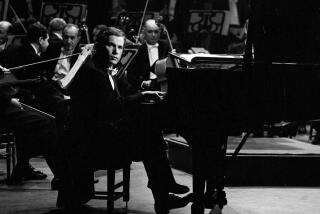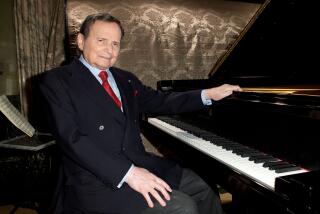Clare Fischer dies at 83; versatile pianist, composer, arranger
Clare Fischer, a Grammy-winning pianist, composer and arranger who crossed freely from jazz to Latin and pop music, working with such names as Dizzy Gillespie, George Shearing and Natalie Cole as well as Paul McCartney, Prince and Michael Jackson, has died. He was 83.
Fischer died Thursday at Providence St. Joseph’s Medical Center in Burbank of complications from a heart attack he had two weeks ago, said family spokeswoman Claris Dodge.
Although he entered professional music through jazz, his expansive creative perspective quickly grew to embrace many other musical areas.
“I relate to everything,” he explained in 1987 in The Times. “I’m not just jazz, Latin or classical. I really am a fusion of all of those.” He went on to describe his fascination with Stravinsky, Schoenberg and Bartok, as well as Duke Ellington, Bud Powell, Lee Konitz, Tito Puente and boogie-woogie pianist Meade Lux Lewis.
Regardless of genre, Fischer’s arranging and composing invariably possessed a rich harmonic palette, one that attracted and influenced other musicians.
“Clare Fischer was a major influence on my harmonic concept,” Herbie Hancock said in a statement on Fischer’s website. Hancock credited Fischer’s arrangements for the 1950s vocal group the Hi-Lo’s with significantly influencing his 1968 recording “Speak Like a Child.”
Pop and rock artists especially valued Fischer’s arranging for the lush, classical qualities of the textures he created, particularly for string ensembles. He worked closely with his son, Brent Fischer, also an arranger and conductor, to provide arrangements and orchestrations for McCartney, Chaka Khan, Carlos Santana, Rufus, Brandy and many others. Fischer’s first music credit in film was for Prince’s “Under the Cherry Moon.”
Fischer was also in demand as a studio keyboardist, performing, composing or arranging for commercials, film and television scores, and for more than 100 albums for other artists.
He released more than 50 albums under his own name in a recording career that began in 1962 with the album “First Time Out.” His diverse ensembles included the Latin group Salsa Picante; the vocal group 2 + 2; his Clarinet Choir; and the 30-piece band Clare Fischer’s Jazz Corps. He also performed solo on piano and paired with Donald Byrd, Gary Foster, Jerry Coker and others.
Fischer’s first classical recording, 2001’s “After the Rain,” was a collection of his symphonic works.
He won two Grammy awards, in 1981 for “Clare Fischer and Salsa Picante Present 2+2” and in 1986 for “Freefall.”
Douglas Clare Fischer was born Oct. 22, 1928, in Durand, Mich., the third of four children. His first instruments were violin and piano; but during high school he added cello, clarinet and saxophone. As a teenager in Grand Rapids, he composed and arranged for big bands.
At Michigan State University, he majored in composition and theory, earning a bachelor’s degree in music in 1951. After serving in the Army, Fischer received a master’s in music from the school in 1955.
His professional career escalated in the late 1950s during his five-year association as pianist/arranger/conductor with the musically adventurous Hi-Lo’s. But his arrangements for Dizzy Gillespie’s 1960 album, “A Portrait of Duke Ellington,” brought him the full attention of the jazz community. Albums for pianist George Shearing, vibraphonist Cal Tjader, alto saxophonist Bud Shank and guitarist Joe Pass followed.
A mid-1970s reunion with Tjader revived Fischer’s fascination with Latin music, via his Salsa Picante group. He was fond of Brazilian music in general and bossa nova in particular.
In 1988, Fischer had a freeway encounter with another driver that escalated into a roadside physical confrontation. Fischer, then 60, was assaulted, suffering a hairline skull fracture and a concussion. It took nearly a year for him to recover and return to music.
“If I discovered anything in that strange, 10-month period of recovery,” Fischer later told The Times, “it’s that music is the one thing that makes me sane.”
He is survived by his wife, Donna; his children, Lee, Brent and Tahlia; two stepchildren, Lisa and Bill Bachman; three grandchildren; and a brother, Stewart.
More to Read
The biggest entertainment stories
Get our big stories about Hollywood, film, television, music, arts, culture and more right in your inbox as soon as they publish.
You may occasionally receive promotional content from the Los Angeles Times.






